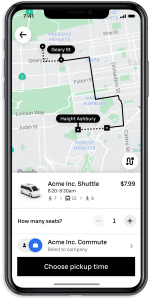Uber for Business, the business side of the consumer ride sharing service, has typically focused on helping companies track their Uber expenses, but during a pandemic needs have changed. It’s no longer about getting employees to and from the airport or shuttling an important client from the hotel to the office, it’s about getting essential personnel to the office safely, and to that end, Uber introduced a couple of new business commuting options today.
“Uber for Business is really about how we allow organizations of all shapes and sizes around the world to leverage the great consumer technology that Uber makes available, for business purposes,” Ronnie Gurion, global head at Uber for Business told TechCrunch.
While the business side of the house helps employees charge business-related Uber rides to their employers, it can now help them choose a couple of commuting options beyond the standard ride sharing everyone has access to, regardless of who is paying the bill.
For starters, the company is introducing Employee Group Rides. Group might be an overstatement, since it involves two employees in the same area sharing an Uber for the purpose of getting to or from work. It works in a similar fashion to the way Uber Pool worked, except it only involves matching employees at the same company.
In terms of safety, Gurion says that Ubers sees this as a ‘transit bubble’ with employees who are working together anyway willing to share a car together. “We’re seeing that companies are finding this option to be more attractive because they are comfortable putting more than one person in the same office in the same car, when they’re going to be in the same office together anyway, once they get to the office. So, it makes things a little more socially distant or creates a social transit bubble, so to speak, to get people to and from the office,” he explained.

Image Credits: Uber
The second option is called Business Charter and this involves Uber connecting the customer to a third-party fleet partner, who can pick up multiple employees and bring them to the office.
“A company can come and create a commute program with Uber across sedans, SUVs, vans and buses, and based on the employee base and commuting data, it might order 20 sedans and X number of our [larger] vehicles, and decide how to deploy them — and we can do that, and those vehicles will only accept rides from that employer,” Gurion said.
As for commuting during the pandemic, Gurion points out that these programs are being introduced in the EMEA, APAC and North American regions for starters, and that each of these geographies is in different places in terms of COVID. “Not every market looks like the US. There are a wide range of situations, but core safety issues are relevant everywhere,” he said.
While Uber has instituted a safety program to help ensure both drivers and passengers are wearing masks, and have devoted $50 million to providing cleaning supplies to drivers, they don’t have a formal testing program for drivers in place, Gurion said. How comfortable employees are with these arrangements will likely depend on individual preferences.
In addition to these commuting options, Uber for Business also offers Uber Eats for Business, a food delivery service geared for business users and Uber Direct, a package delivery platform.
from TechCrunch https://ift.tt/2RLgqOd
via Tech Geeky Hub


No comments:
Post a Comment